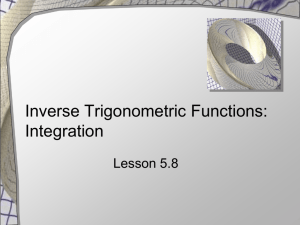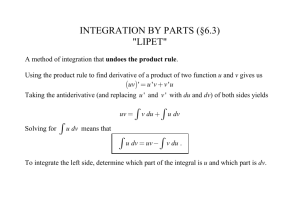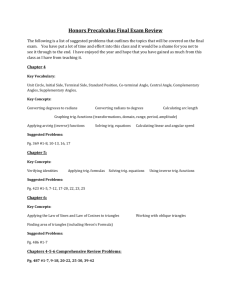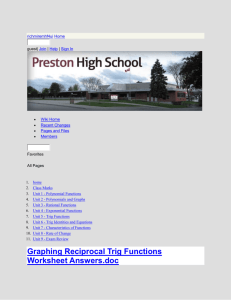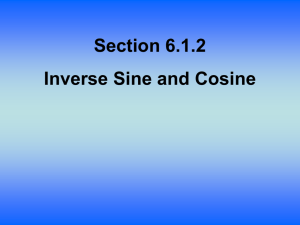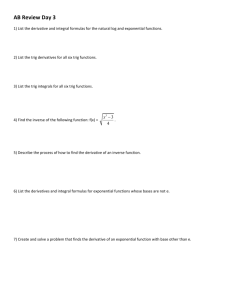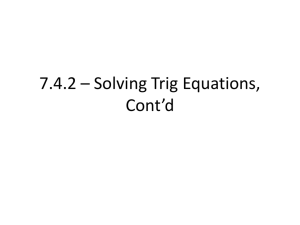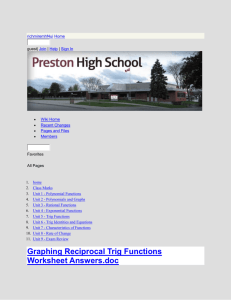Ch. 5D – Inverse Trig Functions
advertisement
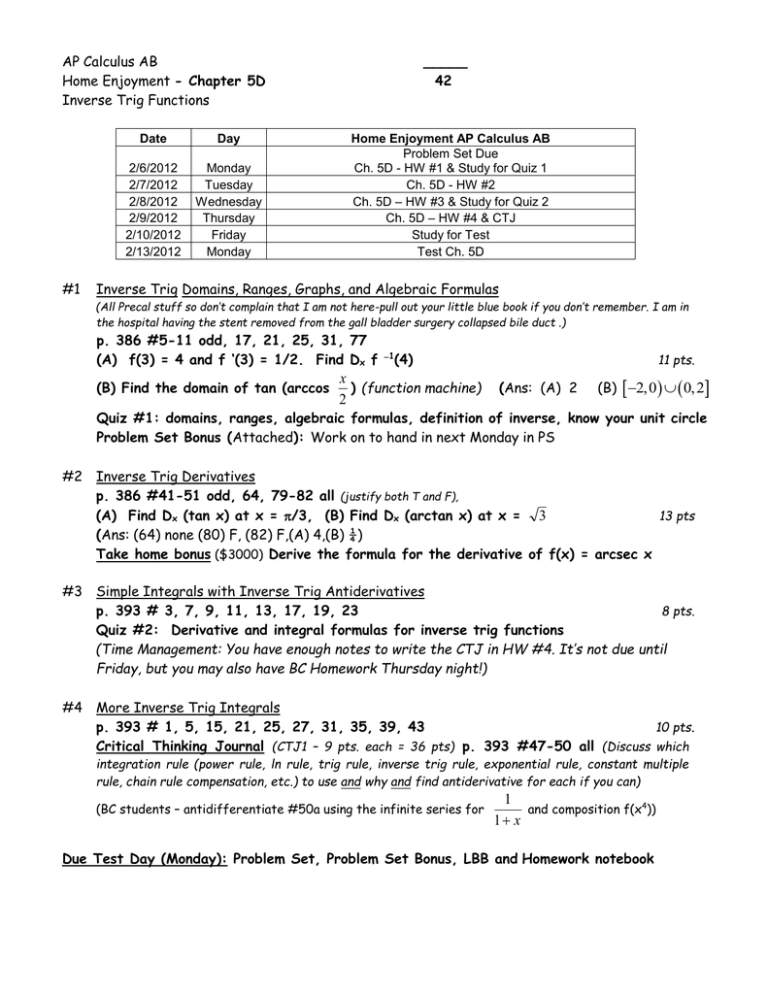
AP Calculus AB Home Enjoyment - Chapter 5D Inverse Trig Functions #1 Date Day 2/6/2012 2/7/2012 2/8/2012 2/9/2012 2/10/2012 2/13/2012 Monday Tuesday Wednesday Thursday Friday Monday _____ 42 Home Enjoyment AP Calculus AB Problem Set Due Ch. 5D - HW #1 & Study for Quiz 1 Ch. 5D - HW #2 Ch. 5D – HW #3 & Study for Quiz 2 Ch. 5D – HW #4 & CTJ Study for Test Test Ch. 5D Inverse Trig Domains, Ranges, Graphs, and Algebraic Formulas (All Precal stuff so don’t complain that I am not here-pull out your little blue book if you don’t remember. I am in the hospital having the stent removed from the gall bladder surgery collapsed bile duct .) p. 386 #5-11 odd, 17, 21, 25, 31, 77 (A) f(3) = 4 and f ‘(3) = 1/2. Find Dx f (B) Find the domain of tan (arccos 1 (4) x ) (function machine) 2 11 pts. (Ans: (A) 2 (B) 2,0 0, 2 Quiz #1: domains, ranges, algebraic formulas, definition of inverse, know your unit circle Problem Set Bonus (Attached): Work on to hand in next Monday in PS #2 Inverse Trig Derivatives p. 386 #41-51 odd, 64, 79-82 all (justify both T and F), (A) Find Dx (tan x) at x = /3, (B) Find Dx (arctan x) at x = 3 13 pts (Ans: (64) none (80) F, (82) F,(A) 4,(B) ¼) Take home bonus ($3000) Derive the formula for the derivative of f(x) = arcsec x #3 Simple Integrals with Inverse Trig Antiderivatives p. 393 # 3, 7, 9, 11, 13, 17, 19, 23 8 pts. Quiz #2: Derivative and integral formulas for inverse trig functions (Time Management: You have enough notes to write the CTJ in HW #4. It’s not due until Friday, but you may also have BC Homework Thursday night!) #4 More Inverse Trig Integrals p. 393 # 1, 5, 15, 21, 25, 27, 31, 35, 39, 43 10 pts. Critical Thinking Journal (CTJ1 – 9 pts. each = 36 pts) p. 393 #47-50 all (Discuss which integration rule (power rule, ln rule, trig rule, inverse trig rule, exponential rule, constant multiple rule, chain rule compensation, etc.) to use and why and find antiderivative for each if you can) (BC students – antidifferentiate #50a using the infinite series for 1 and composition f(x4)) 1 x Due Test Day (Monday): Problem Set, Problem Set Bonus, LBB and Homework notebook AP Calculus AB Ch. 5D Inverse Trig 2 Review I. Some things from Ch. 5B test on Inverses: Definition of Inverse, how to tell if a function has an inverse from a graph (don’t just say hor. line test-explain it), how to tell if a function has an inverse using calculus (don’t just say it is monotonic – how do you tell if it is monotonic using calculus.) f(x) = x + 2x2 , h(x) is the inverse of f(x). Find h’(3). (Ans: 1/5) (4, 8) is a point on f(x) such that f’(4) = 7. Find the slope of f1(x) at x = 8. (Ans: 1/7) II. Know the unit circle to solve problems like cos-1 ½ , arcsec (-2), arcsin (-½), arctan (-1) (similar to those on the first quiz) III. Draw triangles to help you solve cos (arccsc -5/3) (Ans: 4/5) IV. Know the domains and ranges of the inverse trig functions. V. Derivatives: 1 Answers (to V and VI): (1) Dx tan (2) (3) Dx csc1 (cos 3x) y = x cot x + sec1 x. Find dy/dx (4) 7x 4x 2 4 7x y arccos x (1) dy Find dx (2) (3) (6) (7) (8) (9) (10) (11) (12) (13) 1 cos 2 x x4 16 x 2 dx x 2 4 x 13 cos3x cos 2 3x 1 1 x csc 2 x cot x arccos x (28 x3 ) 1 1 36 x 2 dx 1 1 16 x 2 dx 1 x 9 x 2 1 dx 1 25 x 2 dx x3 1 x8 dx sin x dx 2(1 7 x 2 4 x) 7 x 2 4 x 3sin 3 x x VI. Integrals: (5) 14 x 4 (4) (5) (6) 7 x4 1 x2 arccos 2 x 1 arctan 6 x C 6 1 arcsin 4 x C 4 (7) arcsec 3x + C (8) arcsin (9) 1 arctan x 4 C 4 x C 5 (10) arccos (cos x) + C = x + C (if 0 x , x 0 ) dx The slope of the curve is x2 1 2 (11) 16 x 4 arcsin 1 and it 1 x2 passes through the point (1, 1). Find the equation of the curve y = f(x). (This is a DE with an IVP not a tangent line problem.) (12) 1 x2 arctan C 3 3 (13) y arctan x 1 4 x C 4 AP Calculus AB Ch. 5D Inverse Trig 3 Little Black Book of Calculus Properties Ch. 5D – Inverse Trig Functions 5D-1 5D-2 5D-3 5D-4 5D-5 5D-6 5D-7 5D-8 5D-9 (x) = arcsin x (two notations, graph, domain, range, how to find arcsin ⅓ on calculator – must give answer, 2 examples from unit circle from the two quadrants in which the answers are possible, state the ex. such as arcsin (-) = ___ because …) (x) = arccos x (two notations, graph, domain, range, how to find arccos ⅓ on calculator – must give answer, 2 examples from unit circle from the two quadrants in which the answers are possible.) (x) = arctan x (two notations, graph, domain, range, how to find arctan ⅓ on calculator – must give answer, 2 examples from unit circle from the two quadrants in which the answers are possible) (x) = arccsc x (two notations, graph, domain, range, how to find arccsc 3 on calculator – must give answer, 2 examples from unit circle from the two quadrants in which the answers are possible) (x) = arcsec x (two notations, graph, domain, range, how to find arcsec 3 on calculator – must give answer, 2 examples from unit circle from the two quadrants in which the answers are possible) (x) = arccot x (two notations, graph, domain, range, asymptotes, how to find arccot 3 on calculator, 2 examples from unit circle from the two quadrants in which the answers are possible) General information on Inverse trig functions (Explain when to use +2k when solving for x. Solve 2 trig examples on calculator: sin x = 0.4 and x = arcsin 0.4. Solve two trig examples without calculator: sin x = ½ and arcsin ½ = x. Determine the domain of tan (arccos x/4) and explain how you got it (function machine)) Algebraic formulas for trig functions and inverse trig functions (give example of the right triangles on a graph used to derive each formula) 6 Derivatives of inverse trig functions (Formulas) 5D-10 3 Integrals involving 6 inverse trig functions. (formulas, ex: dx dx ) , 49 x 2 x x 2 36 5D-11 Integrals of rational functions (when to use negative exponents and power rule, ln u, or inverse trig functions, ex. of each) 5D-12 Completing the Square Integration Strategy (when to use strategy and example) AP Calculus AB Ch. 5D Inverse Trig Problem Set Bonus: Let P(t) represent the number of wolves in a population at time t in years, when t > 0. The population P(t) is increasing at a rate directly proportional to 800 P(t), where the constant of proportionality is k. (a) If P(0) = 500, find P(t) in terms of t and k. (6 pts.) (Hint: Set up and solve a differential equation. This is not a logistical growth problem.) (b) If P(2) = 700, find k. (2 pts.) (c) Find the lim P t . (1 pt.) t 4 AP Calculus AB Ch. 5D Inverse Trig 5
